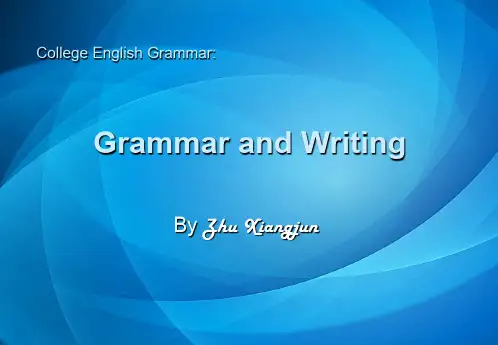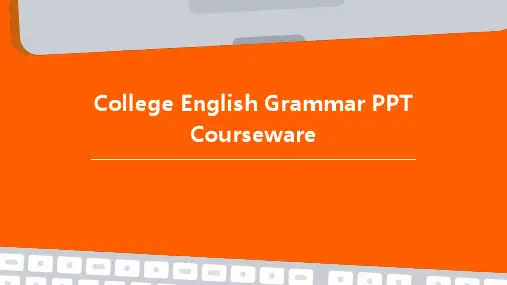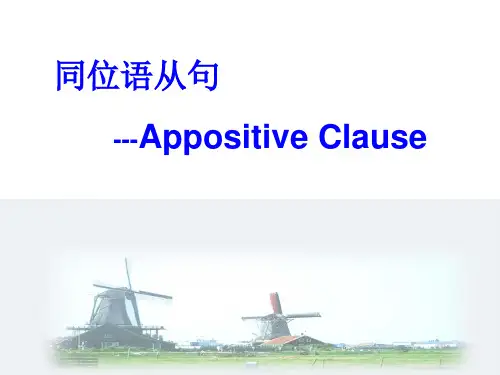《大学英语语法》课件—05Modifiers:Appositives
- 格式:ppt
- 大小:386.50 KB
- 文档页数:27
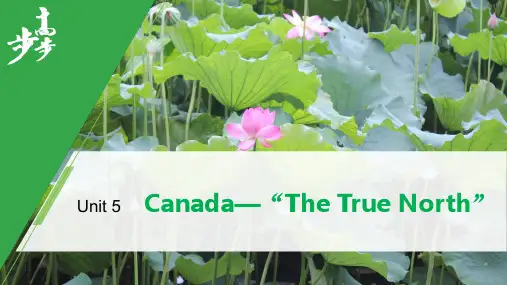
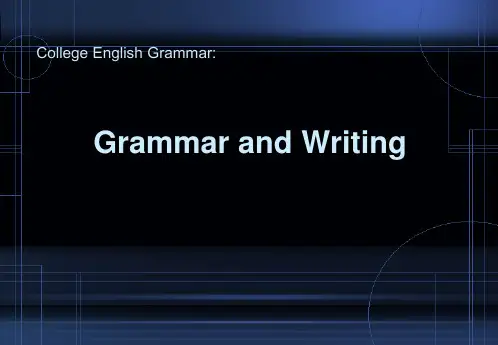
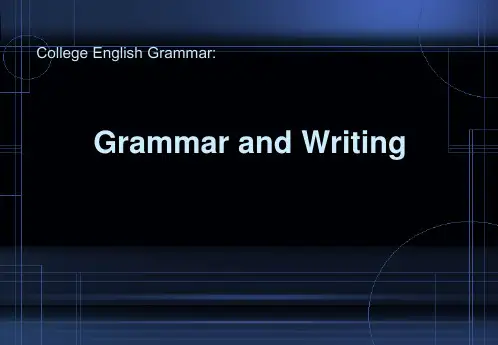
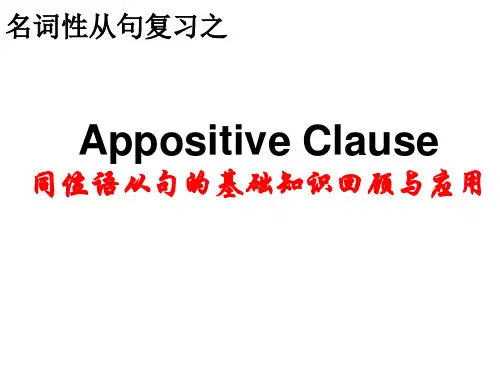

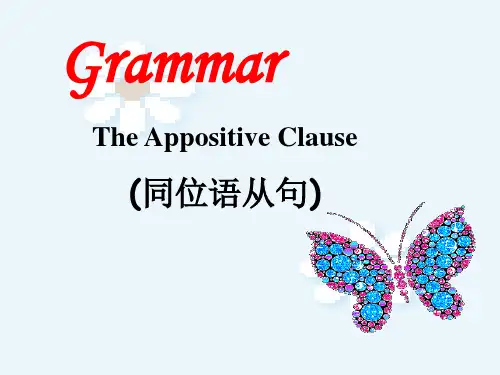
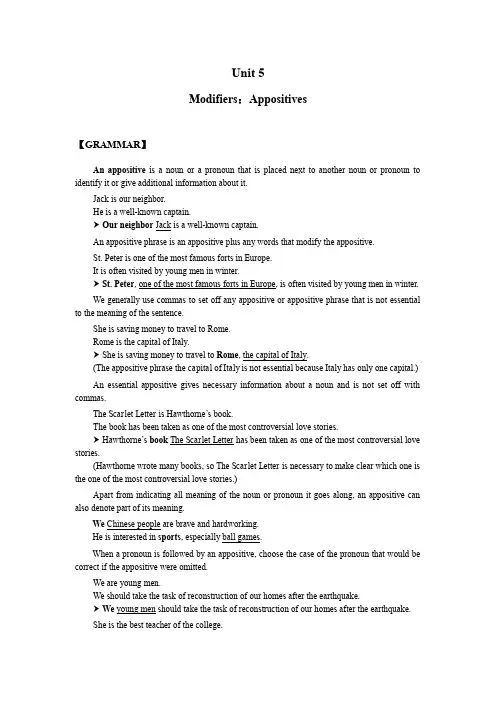
Unit 5Modifiers:Appositives【GRAMMAR】An appositive is a noun or a pronoun that is placed next to another noun or pronoun to identify it or give additional information about it.Jack is our neighbor.He is a well-known captain.⑥Our neighbor Jack is a well-known captain.An appositive phrase is an appositive plus any words that modify the appositive.St. Peter is one of the most famous forts in Europe.It is often visited by young men in winter.⑥St. Peter, one of the most famous forts in Europe, is often visited by young men in winter.We generally use commas to set off any appositive or appositive phrase that is not essential to the meaning of the sentence.She is saving money to travel to Rome.Rome is the capital of Italy.⑥ She is saving money to travel to Rome, the capital of Italy.(The appositive phrase the capital of Italy is not essential because Italy has only one capital.) An essential appositive gives necessary information about a noun and is not set off with commas.The Scarlet Letter is Hawthorne’s book.The book has been taken as one of the most controversial love stories.⑥ Hawthorne’s book The Scarlet Letter has been taken as one of the most controversial love stories.(Hawthorne wrote many books, so The Scarlet Letter is necessary to make clear which one is the one of the most controversial love stories.)Apart from indicating all meaning of the noun or pronoun it goes along, an appositive can also denote part of its meaning.We Chinese people are brave and hardworking.He is interested in sports, especially ball games.When a pronoun is followed by an appositive, choose the case of the pronoun that would be correct if the appositive were omitted.We are young men.We should take the task of reconstruction of our homes after the earthquake.⑥We young men should take the task of reconstruction of our homes after the earthquake.She is the best teacher of the college.The college gave her an award for excellence.⑥ The college gave her, its best teacher, an award for excellence.Appositive give extra information about the subject but don’t change its number. Make sure you don’t mistake a word in an appositive for the subject of the sentence.✓The students each have a dictionary.✗ The students each has a dictionary.E.T. is one of my favorite films.It is directed by Steven Spielberg.⑥E.T., one of my favorite films, is directed by Steven Spielberg.We often see dashes before such expressions as namely and for instance, expressions that introduce appositives.All of them —namely, most of them — have the course.Some vegetables —for instance, carrots and garlic — can help cure certain diseases.An appositive provides more information about a noun like an adjective clause. In fact, we may take an appositive as a simplified adjective clause, that is, to omit the relative pronoun and the verb be.Toni Morrison, who is the winner of Nobel Prize for literature in 1993, is an Afro-American authoress.⑥Toni Morrison, the winner of Nobel Prize for literature in 1993, is an Afro-American authoress.He has sent a thank-you letter to the company, which is a friendly acquirer in a takeover.⑥ He has sent a thank-you letter to the company, a friendly acquirer in a takeover.However, not all adjective clauses can be reduced to appositives in this way --- only those that give extra information and also have a form of the verb to be (is, are, was, were).1. Kinds of appositivesAppositives usually appear in four forms.1)Single appositiveThe most common type of appositives is single appositive which is a noun or a noun phrase used to identify or rename a noun in a sentence and sometimes may instead repeat a noun for the sake of clarity and emphasis:Titanic was a great ship.The ship was in Southampton.The ship sailed on April 10th, 1912.Its destination is New York.⑥The great ship, Titanic, sailed for New York from Southampton on April 10th, 1912.Mrs. Tailor is an old lady.She is very wealthy.She has shared a flat with her children.They have lived there for a great many years.⑥Mrs. Tailor, a very wealthy old lady, has shared a flat with her children for a great manyyears.2)Multiple appositivesTwo, three, or even more appositives may appear alongside the same noun to give an explanation or extra information:Tina, Todd and Sam are my cousins.They arrived at the party together.⑥My cousins—Tina, Todd, and Sam—arrived at the party together.My house was flooded.All of my school work got washed away.My school work includes physics, literature, sociology, and calculus⑥All of my school work—physics, literature, sociology, and calculus—got washed away when my house was flooded.Commas or dashes may be used to set off an appositive. Dashes are useful to prevent confusion when the appositive itself contains commas. Also, using dashes instead of commas serves to emphasize the appositive.3)List appositivesList appositives often go before a pronoun such as all or those or everyone.The pronoun helps to clarify the subject by drawing the items together though it is not essential to the meaning of the sentence: the opening list could serve by itself as the subject.The hill seems to impact on me.The river seems to impact on me.Even the tree seems to impact on me.Even the piece of rock seems to impact on me.⑥ The hill, the river, even the tree, the piece of rock, all seem to impact on me.He had possessed money and beauty.He had possessed fame and status.He had possessed those for quite a long time.Those vanished in the blink of an eye.⑥ Money and beauty, fame and status, those he had possessed for quite a long time vanished in the blink of an eye.4)Negative appositivesMost appositives identify what someone or something is, but there are also negative appositives that identify what someone or something is not. Negative appositives usually begin with a word such as not, never, or rather than.Male students are unlikely to take nursing classes at school.Female students are most likely to take nursing classes at school.⑥Female students, not male students, are most likely to take nursing classes at school.People are the real creators of the history.Heroes are hardly the real creators of the history.⑥People, rather than heroes, are the real creators of the history.2. Position of appositivesAn appositive most often appears directly after the noun or pronoun it identifies, explains or renames:He told me this by himself.His uncle is named Jim.His uncle is a black poet.His uncle is world-famous.⑥He himself told me that his uncle Jim is a world-famous black poet.There are many ways to preserve the history.One of them is to recount it as sagas.Sagas are legends.Legends are handed down from the generation to another.⑥One of the ways to preserve the history is to recount it as sagas --- legends that are handed down from one generation to another.Occasionally, an appositive may comes before a word that it identifies or renames. When at the beginning of a sentence, the appositive is always separated by a comma from the rest of the sentence.Mexico City has many archaeological sites.These sites are interesting.Mexico City is the biggest city in the world.⑥ The biggest city in the world, Mexico City has many interesting archaeological sites.Wassily Kadinsky is known for his paintings.His paintings are colorful.His paintings are abstract.Wassily Kadinsky is an innovator.He is bold.⑥ A bold innovator, Wassily Kadinsky is known for his colorful abstract paintings.An appositive may also be placed at the very end of a sentence. The end appositive is usually given a special emphasis. Compare:a) The train finally arrived and two young men—one big and broad,the other small and slight—stepped onto the platform.b) The train finally arrived and two young men stepped onto the platform—one big and broad, the other small and slight.The appositive in sentence A merely interrupts the sentence to give extra information while it marks the climax of the sentence B.Notes:1)A pronoun such as we, us, you, they is often followed by a noun to identify it as an appositive.Are you two going to apply for this position?The headmaster shows great concern for us students.Mother asked you boys to be quiet.We movie-fans often go to the theaters regularly.2) A pronouns such as all, each, neither, none often goes after a noun or a pronoun as an appositive to give more definite information.We all have our own attitude to bringing up children.In the police office, we none of us said anything.I bought the girls each an ice cream.They’ve neither of them succeeded in winning her confidence.3)Besides nouns and pronouns, other word classes also have their appositives such as verbs, adjectives, adverbs, prepositional phrases and so on.They always murmur in meetings—that is, speak in a very low voice. (verb phrase as appositive)After marriage, he turned thriftier—more attentive to the expenses of life—than he had been. (adjective phrase as appositive)Our English teacher often asks us to speak so—slowly, loudly and clearly. (adverbs as appositive)Most visitors reach Scotland from the south, that is, from England. (prepositional phrase as appositive)4) An infinitive or gerund may go after a noun as an appositive to identify what it is.Very soon they received the order to start the general attack.The old lady followed the instruction to place the money in a cardboard box and to leave it outside her door.He has eventually gotten a job yesterday driving a truck.Linda got a place in a laundry ironing shirts.5)Words that are often used to introduce an appositive:a) To indicate equality such as namely (or viz.), that is (i.e.), that is to say, in other words, for short, etc.I want to talk today about a major threat facing our society, namely AIDS.Literal translation, in other words word-for-word translation, is not to be encouraged.b) To list examples such as for example, for instance (e.g.), such as, say, let us say, including, etc.Mistakes began to occur in the late fifties, for instance, the Great Leap Forward.Everything was in apple-pie order, including the desk.c) To add emphasis such as especially, particularly, chiefly, mostly, mainly, etc.This is a day to get things out into the open, particularly money matters.Their electrical products, mainly e-book and MP4, are very welcomed by teens.。
